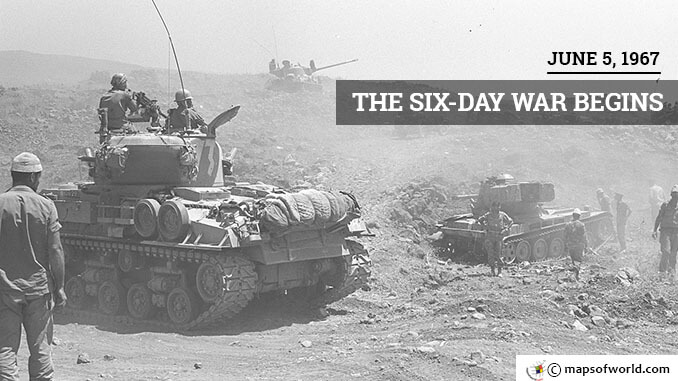The Six-Day War of 1967 was a major turning point in early years of the Arab-Israeli conflict. Apart from thrusting the Palestine Liberation Organization into prominence, the war also served to establish the State of Israel as a power to reckon with. The war commenced on June 5, 1967 and ended on June 10, 1967 in a resounding Israeli dominance. The decisive victory provided Israel a number of advantages the including recognition of Egypt, a major Arab nation and the victory over Jerusalem – a city held sacred by the Jews. The roots of the State of Israel were thus firmly established following the Six-Day War. Israel had been in a near-constant state of conflict with its Arab neighbors since its inception in 1948. The Arab nations had refused to acknowledge Israel as a state and Egypt was among the state’s greatest detractors. The 1949 Armistice Agreement was successful in preventing major warfare but the days following the Suez Crisis in 1956 saw heightened tensions in the region and necessitated the presence of UN peacekeeping forces to ensure compliance of the agreement. In 1964, the Palestine Liberation Organization (PLO) was formed and the organization immediately set about its agenda of unceasing guerilla warfare against Israel. The PLO launched its campaigns from various bases in Egypt, Syria, and Jordan. From 1965 through 1967, the Israeli border was the scene of a series of attacks and skirmishes. Israeli retaliation followed a gradual but ominous build-up of Arab forces across the borders of the state. In 1967, a Russian intelligence report to Syria warned of the deployment of Israeli troops on the Syrian border with the intention of a possible invasion. While the accuracy of the report was still suspect, the report did alarm Syria enough to seek out the support of Egyptian President Nasser. By mid-May, President Nasser had asked the UN forces in Sinai to leave and had started to build up troops in the Sharm el-Sheikh region overlooking the Straits of Tiran. The straits themselves had become a major bone of contention. While the Arab nations believed that they retained the right to regulate any passage through the straits, Israel had declared that closing down the straits would be considered an act of war. On May 22, President Nasser issued orders for the straits to be closed to Israeli movement. On May 30, the Arab nations further escalated the crisis in the form of a defense pact between Jordan and Egypt. By June 4, Israel’s National Unity government had approved the subsequent war and sweeping preemptive attacks were launched the next morning. Egypt deployed about 240,000 troops while Syria, Jordan, and Iraq together had sent in about 307,000 troops against the 50,000 troops and 214,000 reserves of Israel. While on paper the odds looked stacked against the Jewish state, the Arab troops suffered large-scale losses due to the strategic superiority and better training of the Israeli military. Israel routed the Egyptian air force with missile power and caused major damage to Egyptian tanks in the Sinai and Gaza regions. Israel had deployed 300 combat aircrafts to the 957 aircrafts sent in by the Arabs. Israel’s immense missile power contributed significantly in the ultimate victory. Without the cover of the aircrafts, the Arabs faced a humiliating defeat on the ground as well. On June 10, a UN ceasefire was brokered bringing an end to the Six-Day War but by this time Israel had swollen many times in size and had successfully taken over Golan Heights from Syria, Sinai from Egypt, and established a firm control over the Gaza Strip. The most significant annexation, however, was that of Jerusalem. The war left the territory riddled with hundreds of thousands of Palestinian refugees and immediately brought the PLO into sharp focus. Also On This Day: 1723 – Economist Adam Smith is born in Scotland. 1933 – The USA goes off the gold standard. 1968 – Senator Robert Kennedy is shot. 2004 – 40th president of the United States, Ronald Reagan, dies in Los Angeles.
June 5 1967 – The Six-Day War begins
The Six-Day War of 1967 was a major turning point in early years of the Arab-Israeli conflict. Apart from thrusting the Palestine Liberation Organization into prominence, the war also served…
349
